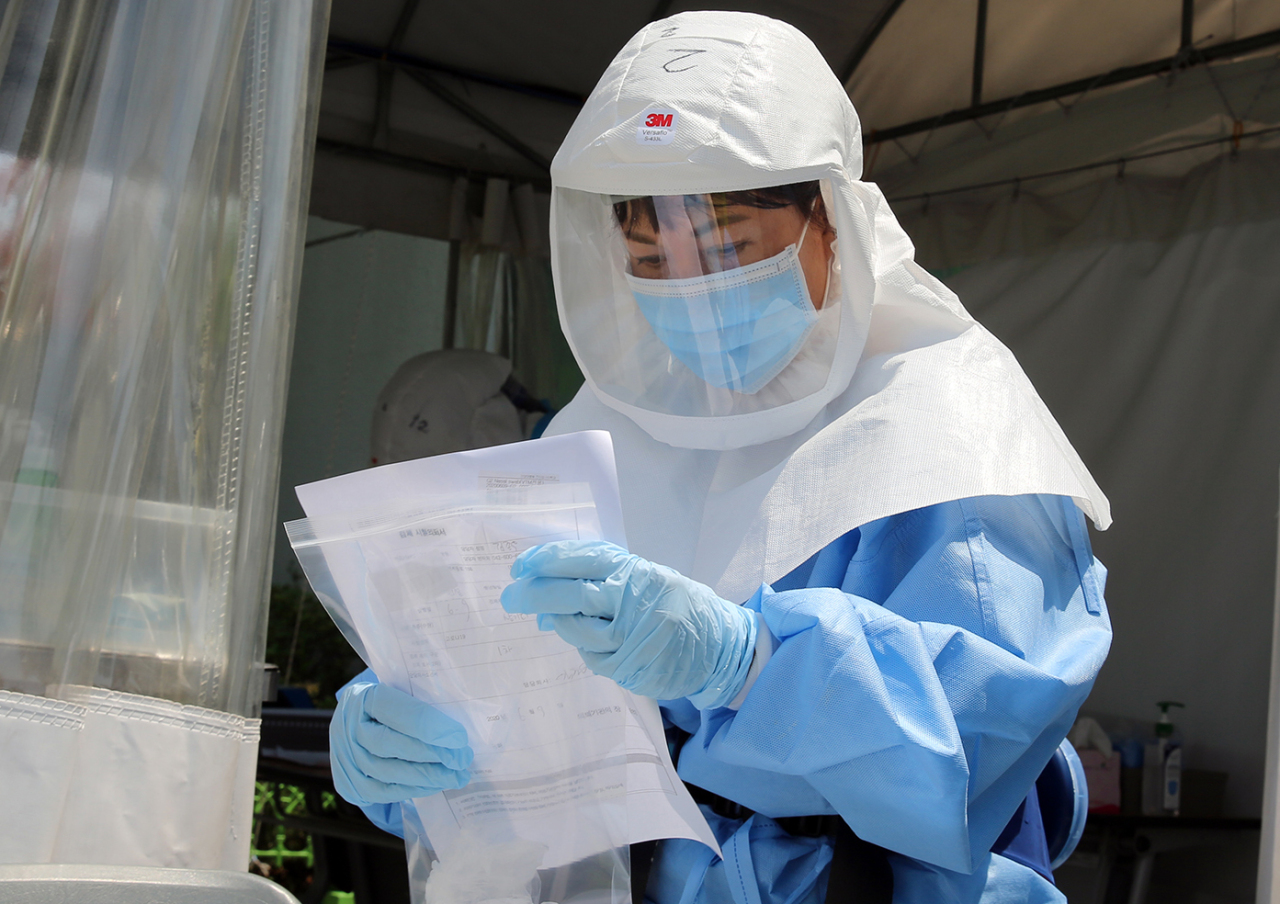Clinical data on 5,500 COVID-19 cases to be unveiled
By Park Han-naPublished : June 25, 2020 - 16:03

South Korea’s health authorities said Thursday they will provide epidemiological information collected from thousands of local COVID-19 patients to medical professionals, in a bid to come up with effective measures to counter a possible resurgence of the virus.
The Central Disaster Management Headquarters and National Medical Center will disclose clinical data on 5,500 people who have been released after fully recovering from the virus, through Friday.
The large volume of data ranges from basic information of individuals such as gender and age to their medical history, examination results and clinical improvement during hospitalization.
Information on whether the patients used a ventilator or oxygen mask and what types of blood tests they underwent will also be available.
“Through this disclosure of clinical and epidemiological information, I expect various experts will produce vast scientific data needed to establish infection prevention and control measures,” said Jeong Eun-kyeong, chief of the Korea Centers for Disease Control and Prevention.
All information will be anonymized for privacy protection.
In July, data on underlying diseases of patients and list of medications prescribed by doctors will be added.
South Korea reported 28 more cases of the coronavirus on Thursday, as chain transmissions traced to small infection clusters here continue to add new cases in the Seoul metropolitan area as well as Daejeon. The nation’s total infections stood at 12,563.
Seoul and Gyeonggi Province registered nine cases each, while nearby Incheon added one new infection. Daejeon reported four.
As of noon Thursday, new infections linked to door-to-door sales companies in Daejeon rose by 13 in 24 hours, bringing the total to 71.
Four more cases traced to a small gathering, which health authorities suspected to be a sales meeting, in Seoul’s Gangnam were confirmed, bringing that total to seven.
Containing sporadic cluster infections has become the country’s biggest mission to root out the virus. Cluster infections account for 49.8 percent, or 316 cases, out of 634 reported in the last two weeks.
Inspections on door-to-door sales firms and multilevel marketing businesses have been strengthened in the wake of chain transmissions.
The Busan Metropolitan Government and Busan Metropolitan Police Agency said Thursday they had begun on-site inspections into such companies designated as high-risk facilities to ascertain whether they were properly implementing virus prevention measures. They are required to list the names of people who access the sites, must wear face masks and are banned from mass gatherings. Those who violate the rules can face a fine of up to 3 million won ($2,500).
Health authorities said Thursday they expect that the average period of COVID-19 patients’ hospital stays will be reduced by 30 percent with the government’s decision to relax requirements for releasing coronavirus patients from quarantine.
Starting Thursday, asymptomatic patients are allowed to be released from quarantine if they show no symptoms for 10 days after having tested positive.
Requirements for patients with symptoms are also eased to meeting just one out of two criteria -- when they have tested negative twice in a 48-hour period or when they showed no fever without the use of an antipyretic drug after at least seven days have passed since the date of a positive COVID-19 diagnosis.
According to Yoon Tae-ho, a senior official at the Central Disaster Management Headquarters, the typical number of days a patient tests positive for the virus has been 28 days, but the number significantly comes down to 13 days when the new rules are applied.
In Daejeon, which has recently seen infection clusters traced to door-to-door sales companies, Yoon said the city faced a shortage of negative-pressure rooms, but that it agreed with other city and provincial governments, including Sejong and North and South Chungcheong Provinces, to share their wards beginning in early June.
“We think there will be no problem sharing hospital wards as the other regions haven‘t reported many new cases,” he said.
Some 189 workers at e-commerce giant Coupang were put under self-isolation after an employee in his 50s tested positive Wednesday. One of his family members also was confirmed to have contracted the virus on Thursday.
The company immediately shut down its logistics centers in Bucheon, Gyeonggi Province, where 2,300 people including the patient were employed. Coupang closed its logistics centers in Bucheon and Goyang on May 24 and 28 following detections of COVID-19 cases.
The Korea Centers for Disease Control and Prevention said 44 more people were released after fully recovering from the virus, bringing the total number of recoveries to 10,974.
The death toll from COVID-19 rose by one to 282. The fatality rate marked 2.24 percent.
A 78-year-old man with an underlying disease died at Sahmyook Medical Center in Seoul on Wednesday, 10 days after he tested positive. With his death, a total of seven people have died from the virus in Seoul.
By Park Han-na (hnpark@heraldcorp.com)







![[Graphic News] More Koreans say they plan long-distance trips this year](http://res.heraldm.com/phpwas/restmb_idxmake.php?idx=644&simg=/content/image/2024/04/17/20240417050828_0.gif&u=)
![[KH Explains] Hyundai's full hybrid edge to pay off amid slow transition to pure EVs](http://res.heraldm.com/phpwas/restmb_idxmake.php?idx=644&simg=/content/image/2024/04/18/20240418050645_0.jpg&u=20240419100350)






![[From the Scene] Monks, Buddhists hail return of remains of Buddhas](http://res.heraldm.com/phpwas/restmb_idxmake.php?idx=652&simg=/content/image/2024/04/19/20240419050617_0.jpg&u=20240419175937)

![[KH Explains] Hyundai's full hybrid edge to pay off amid slow transition to pure EVs](http://res.heraldm.com/phpwas/restmb_idxmake.php?idx=652&simg=/content/image/2024/04/18/20240418050645_0.jpg&u=20240419100350)

![[Today’s K-pop] Illit drops debut single remix](http://res.heraldm.com/phpwas/restmb_idxmake.php?idx=642&simg=/content/image/2024/04/19/20240419050612_0.jpg&u=)